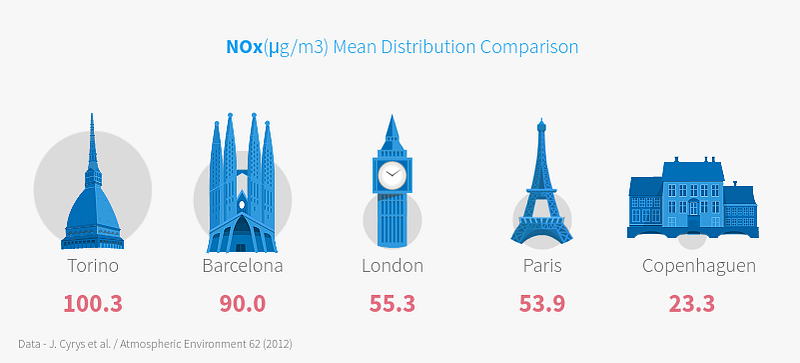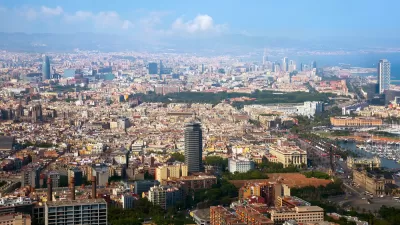The capital of Catalunya is suffering from persistent high pollution due to car density and the largest number of motorcycles in Europe. City administrators, aware of the situation, have been unwilling to take any action that would upset drivers.
This week I was pleasantly surprised to see a new campaign on the Barcelona City Council website showing the city’s big pollution problem and laying out its main causes and consequences.

Source: Barcelona City Website
Barcelona is not alone. Just last week Madrid, for the first time ever, implemented its pollution protocol level 3, which means that half of the cars were banned from entering the city center (inside the M-30 beltway). Level 2 (banning curbside parking) had been implemented several times last year, as the capital of Spain continuously breaks the EU limits on particulate matter (PM) and Nitrogen Oxide (NO2).
As other cities have discovered, limiting incoming private motor traffic helps curb pollution, alleviate congestion, and reduce transit times. The possibility of creating a congestion charge in Barcelona, similar to the one in London, has been suggested several times in recent years. But the lack of political will of different administrations has guaranteed that those proposals never go further than the paper they’re printed on.
FULL STORY: Barcelona Needs Swift Action Against Pollution

Manufactured Crisis: Losing the Nation’s Largest Source of Unsubsidized Affordable Housing
Manufactured housing communities have long been an affordable housing option for millions of people living in the U.S., but that affordability is disappearing rapidly. How did we get here?

Americans May Be Stuck — But Why?
Americans are moving a lot less than they once did, and that is a problem. While Yoni Applebaum, in his highly-publicized article Stuck, gets the reasons badly wrong, it's still important to ask: why are we moving so much less than before?

Using Old Oil and Gas Wells for Green Energy Storage
Penn State researchers have found that repurposing abandoned oil and gas wells for geothermal-assisted compressed-air energy storage can boost efficiency, reduce environmental risks, and support clean energy and job transitions.

Updating LA’s Tree Rules Could Bring More Shade to Underserved Neighborhoods
A new USC study finds that relaxing Los Angeles’ outdated tree planting guidelines could significantly expand urban tree canopy and reduce shade disparities in lower-income neighborhoods, though infrastructure investments are also needed.

California's Canal Solar Projects Aim to Conserve Resources and Expand Clean Energy
California’s Project Nexus has begun generating electricity from solar panels installed over irrigation canals, with researchers and state agencies exploring statewide expansion to conserve water and boost clean energy production.

HHS Staff Cuts Gut Energy Assistance Program
The full staff of a federal program that distributes heating and cooling assistance for low-income families was laid off, jeopardizing the program’s operations.
Urban Design for Planners 1: Software Tools
This six-course series explores essential urban design concepts using open source software and equips planners with the tools they need to participate fully in the urban design process.
Planning for Universal Design
Learn the tools for implementing Universal Design in planning regulations.
Heyer Gruel & Associates PA
City of Moreno Valley
Institute for Housing and Urban Development Studies (IHS)
City of Grandview
Harvard GSD Executive Education
Salt Lake City
NYU Wagner Graduate School of Public Service
City of Cambridge, Maryland



























